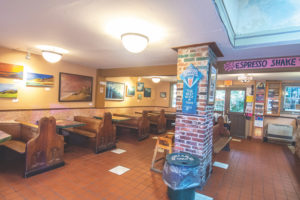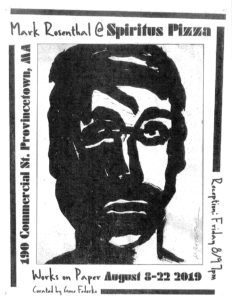
PROVINCETOWN — Artists, gallery owners, and retailers gave resoundingly bad reviews to Ray Wiggs’s attempt to have the town ban the sale of fine art in restaurants, bars, and inns at an Oct. 22 meeting of the Provincetown Licensing Board.
“I don’t think anyone here can honestly say it’s fair that someone can host a show at a pizza place,” Wiggs said, “and pass out 150 flyers all over town, which say, ‘Don’t buy at expensive galleries. Come buy directly from the artist tonight.’ ”
Town regulations restrict food trucks as a protective measure for restaurants, argued Wiggs, owner of the Ray Wiggs Gallery at 432 Commercial St. The town should likewise protect gallery owners from being undercut by restaurants and inns that can sell paintings as an ancillary to their main businesses without incurring the same overhead costs as galleries.
Wiggs had asked the licensing board to create regulations that allow galleries “to operate on an even playing field.” Last week the board heard from the public on this idea, but it won’t vote on any new regulations until about January, said Aaron Hobart, Provincetown’s licensing agent.
Wiggs’s proposal has run into almost universal resistance and appears to touch a nerve even with his fellow gallery owners who remember being struggling artists themselves.
Photographer Marian Roth said she first exhibited her work in 1984 at the Sea Fox restaurant, and she got her first job after the owner of Provincetown Magazine saw her work while he was eating lunch.
Gallery owner, retail shop owner, and artist Cid Bolduc told the licensing board she has considered this issue from many perspectives and concluded, “Sometimes more restriction and rules is not the solution.”
Bolduc is the co-owner of the Cid Bolduc Gallery and Cape Art Tiles. “Retail owners suffer the same sort of competition,” she said. “We live in a resort town, with a very small window of opportunity to make sales. It’s weather dependent. It’s economy dependent.”
Early in her career her own work was shown by gallery owner Robin Watson in partnership with Café Edwige, Bolduc said. Her work sold to restaurant customers who might never have gone into the gallery.
“I’ve shown at Spiritus,” she said. “I’m still here and I’m in my fourth decade.”
Wiggs told the licensing board he represents other gallery owners who are too afraid to speak because of possible repercussions from the community.
Francesca Cerutti, co-owner of the Cid Bolduc Gallery, questioned Wiggs’s claim. “None of them are here tonight,” said Cerutti. “It’s just hearsay. I urge the board not to upset the apple cart and don’t listen to one disgruntled gallery owner.”
Cerutti added, “I relish that there is art in every nook and cranny in this town, whether it’s at a pizza place or an ice cream place or at someone’s house.”
Though no one at the crowded meeting spoke up in Wiggs’s defense, the spouse of one gallery owner did write a sympathetic letter.
Bob Daniels, whose wife, Mary Feeley, is the director of Hutson Gallery, wrote, “It’s naive to believe individuals can sell whatever they want, wherever they want, and whenever they want. If so, Scott would still be selling cupcakes on the street. [This reference is to Scott Cunningham, who had to get a brick-and-mortar shop for his “Scott Cakes.”] And MacMillan Pier would be lined with food trucks.”

Provincetown, the oldest continuous art colony in the nation, has around 50 galleries. The Provincetown Art Association & Museum boasts 900 member artists from 28 states and eight countries, said Chris McCarthy, PAAM’s executive director.
Wiggs had included in his presentation to the licensing board a definition of “fine art” from the Metropolitan Museum of Art and the Philadelphia Museum of Fine Art.
But McCarthy said no one has the qualifications, not even a museum director, to define “fine art.”
Wiggs said town regulations should protect the “gallery system.” But Pete Hocking, an artist and art professor at Goddard College, called it more of an “art ecology” based on young people who need unconventional spaces.
Hocking said he and his friends recently challenged themselves to name as many local artists as they could who are under age 35.
“No one could get over 14,” he said.
Gallery owners face enormous financial pressure, Hocking said, and some artists’ work doesn’t sell. Provincetown is a place to meet emerging artists that one day can be brought into galleries, he said.
John Yingling, a restaurateur in Provincetown since 1971, hit the same point hard when he spoke with the Independent on Monday.
The motto of his first restaurant, Spiritus Pizza, is “Pizza meets coffee meets ice cream meets art,” its website states. Yingling doesn’t have a gallery license, nor does he intend to get one. He said he doesn’t take any commission. He just likes to see the art on the walls of his pizza place, and at his other restaurants.
Yingling said he exhibits the work of unknown artists who are talented but don’t command the high prices that more established artists do, and he claimed to have the best art in town.
Furthermore, Yingling added, the art that sells and is ubiquitous — paintings of dories and “nude guys” — isn’t exactly the pinnacle of creative expression.
“Provincetown is one of the foremost art colonies and emerging artists have no place to sell their stuff,” Yingling said. “Galleries don’t want them.”
